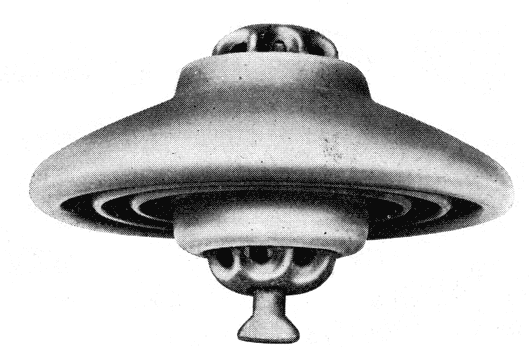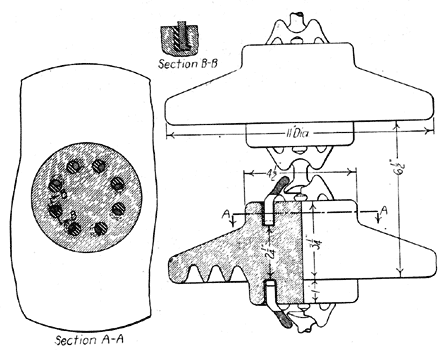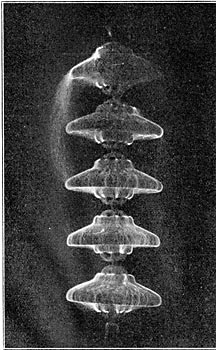[Trade Journal]
Publication: Electrical Review and Western Electrician
Chicago, IL, United States
vol. 69, no. 1, p. 38-39, col. 2, 1-2
New High-Tension Suspension Insulator.
One of the greatest problems in high-tension power transmission is in properly insulating the lines. Great developments in the construction of insulators have taken place, particularly since the introduction of the suspension-type units. An interesting development in this line is now promised in the new J-D high-tension disk insulators, which the Jeffery-Dewitt Company, of Detroit, Mich., is now ready to manufacture on a large scale. This company has in the last eight years established an enviable reputation in the manufacture of porcelain for spark plugs. As the result of exceptionable success in this line studies have been made on the construction of high-tension porcelain insulators and after long experimentation an improved design has been perfected. The manufacture of these insulators has been put under the direction of an experienced ceramic engineer, Robert M. Johnston, who has developed a superior process of porcelain making that is said to overcome the weaknesses of the older methods.
 |
| New Types of Suspension Disk Insulators Being Placed on Market by the Jeffery-Dewitt Company. |
The design of the J-D disk insulator has aimed to produce a theoretically correct insulator as practical as possible. The marked distinguishing feature of the new unit is its great thickness of dielectric and the perfectly balanced field of stress due to the identical metal electrodes above and below. The minimum effective dielectric thickness of these new disks is 2.25 inches, or about three times this amount for the single-piece units now in use. The stress on the porcelain under all operating conditions is correspondingly lower than on the thinner types. Authorities have proved that insulating materials gradually fail under stresses which cause corona. The critical stress varies with the specific inductive capacity of the material; for porcelain, the safe potential gradient is about 40,000 volts per inch of thickness. The J-D disk unit, as proved by tests, both on normal and high frequency, avoids corona up to 90,000 and even 110,000 volts, whereas a disk 0.75 inch thick is under corona at 30,000 volts. The manufacturer believes the new unit will insulate permanently, because of its safe dielectric stresses. The perfectly balanced field is also very important in securing the full value of the insulating material and enabling the insulator to resist high frequency and other line conditions caused by lightning and switching. In the cap and pin type the area of contact with cement outside is six or seven times that in the pin hole, causing a greatly concentrated stress on the porcelain next the pin hole.
| |||
| High-Frequency Test of Five J-D Disk Insulators at 600,000 Volts and 100,000 Cycles Per Second. First Static Discharge Occurred at 500,000 Volts. |
Several power companies have tested the new disks under oil and punctured some at 300,000 volts. The manufacturer regards 250,000 volts as an average value for puncture strength. These insulators have stood high-frequency flashover for one hour. Each unit is tested mechanically to a strain of 5,000 or 6,000 pounds, then it is tested electrically to flashover for ten minutes on a 60-cycle transformer. A high-frequency oscillator is being built for the company for testing at 250,000 volts. As soon as this is finished, all insulators will be tested on high frequency. The company strongly believes in using high frequency, as it is better to find the weaknesses before putting the insulators on the line than afterward.
 |
| Details of J-D Disk Insulator Units. |

